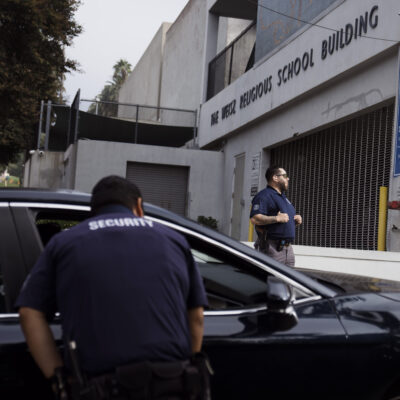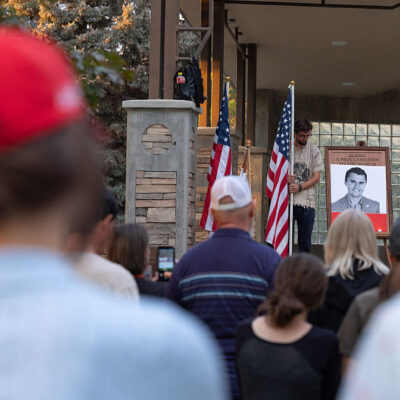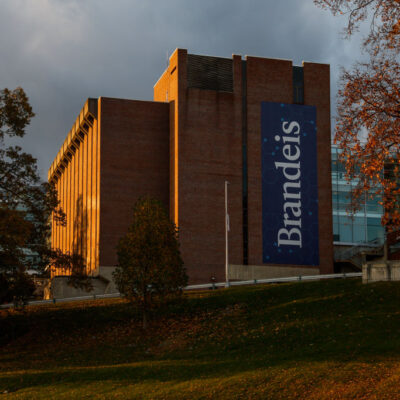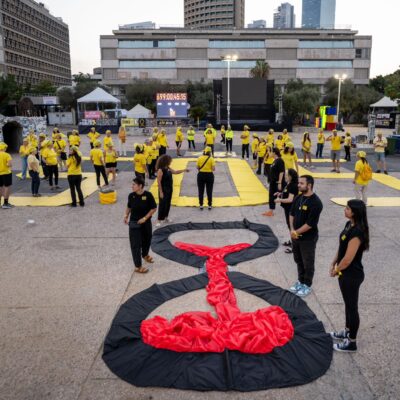Your Daily Phil: Remembering Joel Fleishman
Good Tuesday morning.
In today’s edition of Your Daily Phil, we report on a new study showing high rates of stress among the wives and children of Israeli reservists, displaced families and Arab Israeli parents and on a new L.A.-based program for high school students in honor of Robert Beren. We feature an opinion piece by Rachel Lithgow advocating for greater philanthropic support for Israel’s civil society organizations. Also in this newsletter: Cole Aronson, Michael Bloomberg and Tim Grossman. We’ll start with friends, colleagues and mentees remembering Joel Fleishman.
Joel Fleishman, a scholar and mentor to philanthropists whose impact extended to various areas of Jewish life — from making Torah accessible in several languages to serving as a “pioneer and visionary” for Jewish students at Duke University for more than five decades — died yesterday, reports eJewishPhilanthropy’s Haley Cohen. He was 90.
“Joel Fleishman was the most humble person I have ever met,” Rabbi Gedaliah Zlotowitz, president of ArtScroll and Mesorah Heritage Foundation, told eJewishPhilanthropy. “It’s because of him that Torah learning is accessible to Jews of all backgrounds across the world. Not only did he come up with the idea [for Mesorah Heritage Foundation], but he made sure to get the right people to set it up and he saw it through, staying on the board as a main trustee.”
A lifelong North Carolinian, Fleishman served as a faculty member at Duke University for more than 53 years, where he was a professor of law and public policy. His Duke legacy extended beyond the classroom, especially at the university’s Chabad, which in 2021 was renamed the Fleishman House in his honor.
Shaping the next generation of Jewish minds was especially important to Fleishman who was a founding trustee of the American Hebrew Academy in Greensboro, N.C., and served as trustee of Brandeis University, the Jewish Theological Seminary of America and the American Friends of the Shalom Hartman Institute in Jerusalem. He was also a founding board member of the Partnership for Public Service. Additionally, Fleishman was a member of the board of directors of the Ralph Lauren Corporation.
Yossi Prager, the executive director for North America of the AVI CHAI Foundation, told eJP that he looked to Fleishman as “a leading, if not the leading, scholar of the American charitable foundation.”
“He was also a successful foundation president and a mentor to many foundation professionals,” Prager said, noting that Fleishman’s report on the AVI CHAI Foundation “contained recommendations that became our map to AVI CHAI’s successful final decade.”
Another of Fleishman’s mentees was Sophia Chitlik Abram, a Durham-based philanthropist who founded The Narrow Bridge Fund together with her husband. “I was introduced to Joel in the concept essentially of family,” Chitlik Abram said. After moving to North Carolina, they became “closer and closer” through Shabbat meals consisting of “brisket and brainstorming sessions of philanthropy,” she recalled.
Her favorite brainstorming sessions with Fleishman came years later, though. At the start of the COVID-19 pandemic, Chitlik Abram noticed that Fleishman was having some mobility challenges. “It was clear to me that he needed to be walking more,” she said.
“We’d talk about philanthropy, seminars he was organizing at Duke, his meetings for the week, what was happening in Israel or in U.S. politics,” she said. “That weekly walk was a mentoring session. I have those walks, and the wisdom and knowledge that came with them, stored up in me.”
COSTS OF WAR
A year after Oct. 7, depression, anxiety and stress still plague families of reservists, displaced people, Arab parents — study

After Israel was hit with a deadly surprise attack by Hamas terrorists on Oct. 7, some 360,000 reservists rushed to their units — often leaving comfortable lives and families behind — in a show of selfless patriotism. A year later, the price for that patriotism — especially that shouldered by the spouses and children of reservists — is beginning to come into sharp view, eJewishPhilanthropy’s Judith Sudilovsky reports.
Stress fractures: A new study by the Taub Center for Social Policy think tank in Israel found that parents whose partners were serving in the reserves suffered higher levels of depression, anxiety and stress than parents whose partners did not serve. And it found that children of reservists were more likely to experience more severe emotional and behavioral regressions compared to children of non-reservist parents and exhibit more behavior such as bedwetting, temper tantrums or fear of sudden noises. The study also found that increased stress, anxiety and depression persist for families displaced by Oct. 7 and for Arab parents of young children.
What to do: The researchers recommended expanding targeted support for the vulnerable populations they pointed out by strengthening support systems for the families of reservists, including ongoing psychological assistance, providing emotional support to displaced families where they are staying and developing culturally adapted support programs for the Arab population.
HIGH SCHOOL EDUCATION
L.A.’s Sinai Temple launches Beren Scholars to train teens to combat antisemitism

A year after philanthropist Robert Beren’s death, his daughter, Julie Platt, and her Sinai Temple congregation in Los Angeles have launched a new program in his honor, educating a cohort of Jewish high schoolers about combating antisemitism and the importance of allyship, reports eJewishPhilanthropy’s Judah Ari Gross. The Beren Scholars Program, as it is known, launched on Sunday in a pilot version for 16 high school juniors and seniors from within the synagogue, but Rabbi Erez Sherman, Sinai Temple’s co-senior rabbi, who is leading this new program, said the initiative will expand nationally next year.
The goals: “The three major goals are: one is to have these students actually identify what antisemitism is, to know the roots of it; two is combating it, which is obviously a bit amorphous for teens; and three is learning allyship, which we will actually do with the relationships that we already have built in the Sinai Temple community, both within L.A. and nationally,” Sherman told eJP.
Nowhere off limits: The idea from the program, which is funded by the Robert M. Beren Family Foundation, came from Sherman’s experience in the past year, seeing many of the synagogue’s parents consulting him and the other clergy about where their children should go to college, “as if the rabbi were the academic counselor,” he quipped. “What they were really asking was, ‘Where will my child be safe as a Jew?’” he said. Sherman said he developed the program from there, with the goal of making the answer to that question: anywhere.
STRATEGIC GIVING
Supporting Israel’s greatest asset

“While philanthropy is a laudable pursuit regardless of the sector it supports, there is currently a vacuum effect in the area that I would argue is Israel’s most important asset: its citizens,” writes Rachel Lithgow, founder of the Noga Agency, in an opinion piece for eJewishPhilanthropy. “I want to present what I think is a strong case for heavy investment by family foundations and private citizens in Israel’s civil and shared society organizations.”
Data dive: “A survey conducted by The Center for Jewish Impact (CJI) showed 59% of the Israeli public believe that civil society organizations contributed more significantly to the victims of Oct. 7 and the Swords of Iron War compared to the Israeli government and its institutions. Another survey conducted by Hebrew University found data that, while not shocking, is sobering: Since Oct. 7, 87% of Israeli NGOs have expanded their offerings to add new services, largely because they were experiencing an 84% rise in requests for support by Israel’s citizens… Finally, the most impactful number to support my argument: Only 35% of all NGOs surveyed have seen increased support from private philanthropic foundations and individual donors and investors, which lies in stark contrast to the established investment across military, governmental, medical, academic and technical slices of society.”
Don’t get me wrong: “Birthright and its peers are all-important organizations to support, as are the various universities and cultural institutions, the IDF and the hospitals whose names grace the social calendars of the Jewish world with their $1,000-a-plate dinners… Nevertheless, we should be more or at least equally concerned with the organizations that support the country’s most vulnerable citizens — those who will create Israel’s future — which are being crushed under the slashed budgets and increased needs of wartime.”
Worthy Reads
Be’Ivrit, BeVakasha: In Mosaic magazine, Cole Aronson ponders the failure of American Jews to teach their children Hebrew and what can be done about it. “American Jews do a lot to teach their children Hebrew. Dozens of Jewish day schools teach Hebrew grammar and vocabulary… Synagogue-run Hebrew schools teach children what they need to make it through their bar- and bat-mitzvah services. A new group of charter schools, Hebrew in form and non-parochial in content, is now teaching Hebrew to hundreds of secular and non-Jewish students. By my calculations, the bill for all this Hebrew teaching over the last century exceeds $100 million… And it is a truth (almost) universally acknowledged that these efforts have failed… American Jews, are intelligent, wealthy, and obsessed with education. How do they get so poor an educational result as the one they’ve gotten with Hebrew?… Call it the Zionism deficit—the refusal, conscious or not, linguistically to equip Jewish children raised in the diaspora to leave it.” [Mosaic]
Small Government, Big Impact: In The Conversation, Tom Baker and Alistair Sisson consider the influence that former New York Mayor Michael Bloomber is having on municipal governments around the world. “What is shaping up to be one of the most ambitious projects of the 82-year-old billionaire’s public life is not happening on the highly visible stages of national and international politics. It is unfolding in the stereotypically humdrum halls of city government. Through Bloomberg Philanthropies – the vehicle for his personal and corporate giving – he has advanced an array of initiatives for city government leaders… But while Bloomberg’s philanthropy seems welcomed by city governments, it raises important political issues. Philanthropic funding can be appealing because it comes with fewer strings attached. However, it also comes without democratic accountability. And there are risks in relying on funding streams subject to the whims of billionaires. As ever, the big question about philanthropy is not whether it is useful to those receiving it, but rather should it even exist? Faced with a forbidding fiscal outlook and mounting policy challenges, it’s a question city governments might not have the luxury of asking.” [TheConversation]
Useful Tips: In Inside Philanthropy, Mike Scutari reports on research findings about how to shift reluctant givers into a “possibility mindset.” “One of the most compelling narratives in philanthropy right now isn’t about who’s giving, but about who isn’t giving — and why… A new report written by leaders at the National Center for Family Philanthropy, the philanthropic consulting firm Arabella Advisors and ideas42, a nonprofit that applies behavioral science to social impact challenges, aims to help fundraisers answer that question. Drawing on those groups’ collective expertise and insights from more than 75 donors, family foundation staff and advisors, ‘Overcoming Psychological Barriers to Giving’ lists 10 obstacles preventing individuals — especially those in the higher income brackets — from giving, ranging from too many choices to a lack of time… When it comes to taking that action, the report notes that donors can ‘find a path forward in five cross-cutting ways’: doing ‘one small thing’ to build momentum, reframing preconceptions around issues like defining success, simplifying the operational mechanics of grantmaking, connecting with peers and enlisting help from experts, consultants and advisors.” [InsidePhilanthropy]
Word on the Street
Philanthropist David Magerman, who publicly pulled his donations from the University of Pennsylvania over its response to antisemitism, has donated $1 million to Tel Aviv University to develop a program to teach Hebrew to English-speaking students and integrate them in the university’s STEM programs; Magerman has made similar donations to Bar-Ilan University and the Jerusalem College of Technology…
The International Association of Jewish Free Loan elected Tim Grossman to his second term as president at its conference in Montreal last week; also serving on the board are: Terry Borer, Kim Kaplan, Joanna Wassel, Nancy Weissmann, Selwyn Isakow, Allison Wexler and Ellen Friedman Sacks…
The California man who shot two Jewish men as they were leaving a synagogue in Los Angeles’ Pico-Robertson neighborhood last year was sentenced to 35 years in prison; the Jewish Federation Los Angeles welcomed the sentencing, saying in a statement that it hoped it would “bring closure to the victims and their families and makes our broader Jewish community feel protected”…
The Better Business Bureau offered tips on how to avoid scams for people looking to donate to Hurricane Helene relief efforts…
The New York Times profiled the son of Oct. 7 victim and longtime peace activist Vivian Silver about his efforts to continue his mother’s work after she was murdered in her Kibbutz Be’eri home last year…
The Los Angeles Times interviewed writer Erin Foster, the creator and executive producer of Netflix’s “Nobody Wants This,” a rom-com series starring Adam Brody as a rabbi who enters into a relationship with a non-Jewish podcaster…
The Zionist Organization of America elected Mort Klein to serve as its president for a 12th term…
Google acquired AI developer Noam Shazeer’s Character for $2.7 billion, three years after Shazeer left Google when it opted not to release the chatbot technology he developed…
Pic of the Day

A note is stuck in a mock Western Wall at the Leventhal-Sidman JCC in Newton, Mass., as part of an interactive art installation that was recently installed in the building.
The representation of the Kotel, which was built by Boston Diller Teen Israel Fellows and local ceramicist Noni Armony, will be on display through Oct. 15 in commemoration of the Oct. 7 attacks, and visitors are encouraged to place a note with a prayer in the crevices of the wall. “All notes left in the JCC Kotel will then be brought to Israel and placed directly in the real Kotel at the end of October,” the JCC said.
Birthdays

Professor at the Technion, he won the 2004 Nobel Prize in chemistry, Aaron Ciechanover…
MLB second baseman who appeared in 18 straight All-Star Games, he is immortalized as Jewish in Adam Sandler’s “Chanukah Song,” Rod Carew… Senior judge of the U.S. Court of Appeals for the Ninth Circuit, Andrew David Hurwitz… Co-founder of the publicly traded TechTarget, Bruce Levenson… Copy editor at Politico since 2009, Andrew Goodwin… Film, stage and television actress and, since 2009, an ordained Jewish cantor, Lorna Patterson… The first-ever Jewish chief justice of the Washington State Supreme Court, Steven C. González… Reality television personality, model and actress, Cynthia Dawn “Cindy” Margolis… Democratic candidate for Congress in CO-3, Adam Bennett Frisch… Film director, screenwriter and producer, Stacie Passon… Recently retired director of philanthropic partnerships at the Bill & Melinda Gates Foundation, Robert A. Rosen… Partner at FGS Global, Robert Bennett Seidman… Regional development director at the Foundation for Defense of Democracies, Samantha J. (Greenberg) Weinberg… MBA candidate at Georgetown, Samuel Koralnik… Business development manager at Cympire, Yossi Raskas… Scott Rosenthal…


 Add EJP on Google
Add EJP on Google






